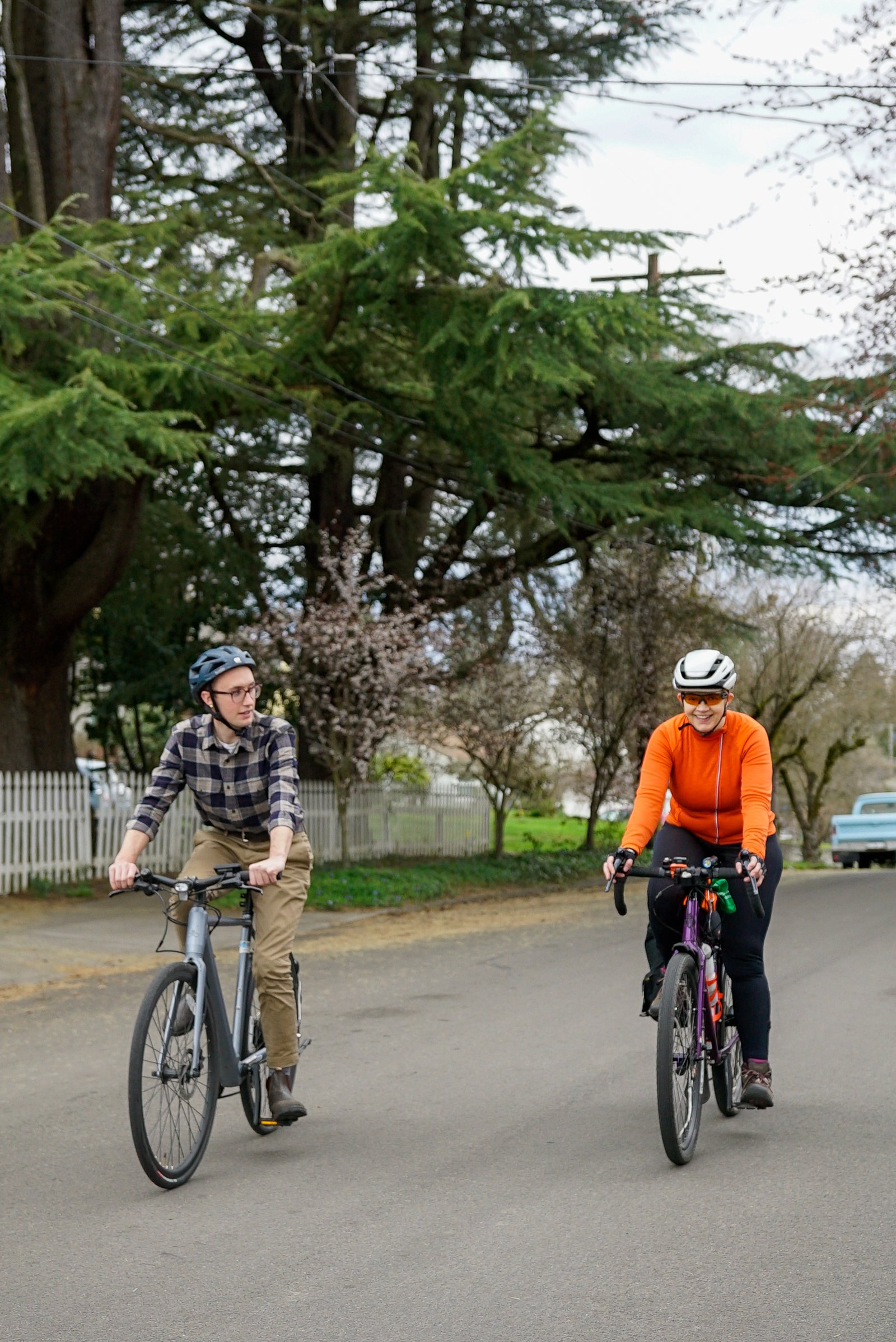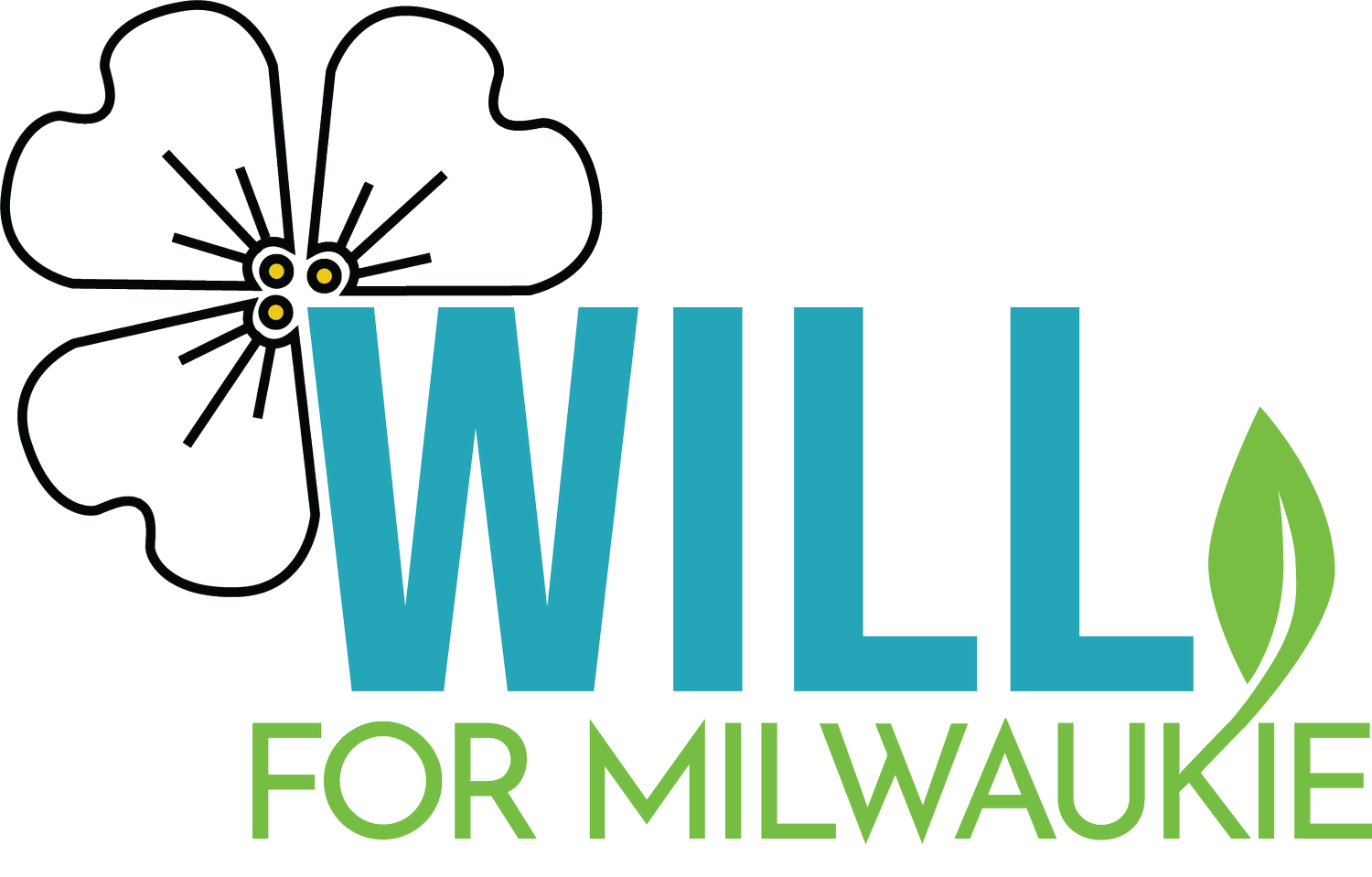
Building a Better Milwaukie, Together
“Milwaukie is changing. But as we move forward, we can’t just grow bigger, we have to grow better.“
This means world-class parks, safe streets for all users, and affordable housing options. We need to encourage mixed-use development and neighborhood hubs to promote access to small businesses throughout the city. And in all this work, we must consider every solution through the lens of equity and climate action.
A lover of the outdoors, Will reveled in our access to open spaces. He was raised biking to school and walking to the library on the weekends, activities that have informed his work in transportation safety. Growing up gay in Central Oregon was challenging for Will, without a visible queer community, he struggled with his identity. This period of his life informed his understanding that diversity and equity must be present in all the work we do, and his commitment to stay true to himself. He left the state to earn his bachelor’s degree in Political Science from Stanford University but quickly realized why his parents decided to move to Oregon in the first place.
Will Anderson chose to call Milwaukie home because he fell in love with our community’s charm. Walking throughout town, you’ll see pride flags, pedestrians, and planter boxes — what more could one ask for in life?
A transportation advocate, Will serves on both the Oregon Transportation Safety Committee and the Safe Routes to School Committee where he manages a $40 million annual budget to improve multimodal transportation options across the state. In his day job, he works in the state legislature advocating for health care non-profits and improving behavioral health services. Previously, he worked for former Rep. Karin Power, who represented Milwaukie in the legislature.
Endorsers
On the Issues
-
Equity is not a one-time policy. It is a lens through which we must consider all our work. As a city councilor, this means challenging how we gather community input (Are NDAs representative of working class and BIPOC voices? Are our city staff reflective of the community we serve and how might that impact the input we solicit?); it means questioning my own assumptions and biases; and it means building a coalition with diverse viewpoints and lived experiences to help inform all of our work.
In this regard, I am proud of the work the city has been doing over the past few years. The Equity Steering Committee and its members have given us clear goals and guidelines going forward. I think it’s especially important to recognize Councilor Desi Nicodemus for his work in this area. In his time on Council, he was a champion for equity and pushed the city to confront our shortcomings.
As your councilor, I believe it’s our responsibility to support the work of city staff, as we implement our new equity goals. In the past few months since hiring an Equity & Inclusion Coordinator, the city has begun implementing initial equity programming; this is precisely the type of work we must uplift. We have a great team of staff across many departments who take our commitment to equity seriously. As Councilors, we must ensure they feel supported in this work.
Underlying all of this is the importance of engaging residents from many different backgrounds. As a young, queer person, I come from a background we don't have on Council at the moment. In the past I’ve worked to encourage new voices, especially young folks, to get involved. As Milwaukie begins to grow and diversify, it is my role as a councilor to empower residents to leave their mark on our community.
-
Let me be clear, we are in the midst of a climate crisis that necessitates bold action. Part of the reason we are even in this position in the first place is a failure of elected leaders to confront the reality of this challenge and meet it with the urgency it requires. While Milwaukie is just a city of 21,000, local action plays an important part in the larger fight to reduce greenhouse gas emissions.
With this in mind, Milwaukie punches above its weight when it comes to addressing climate change, in no small part thanks to the work of climate champions like former Mayor Mark Gamba. Our city’s climate action plan has served as a template for cities across the state. We have a strong tree code to encourage the development of an urban canopy and have made investments in multimodal transportation to reduce greenhouse gas emissions from transportation. We have made some great progress as a city, but we must continue this momentum. In this upcoming budget cycle, I will support adding a staff position dedicated to coordinating climate services in the city to make permanent our commitment to climate change. We must develop a new Transportation System Plan that will provide residents with fun and safe routes to explore the city without a car. And finally, I plan to advocate at the state and federal level for funding to remove the Kellog Creek Dam to provide fish passage to 15 miles of habitat and restore the creek through Kellogg Lake.
-
For years, Milwaukie has been an affordable, working-class community. Yet we are not immune to the regional trend toward rising costs. In conversations with friends and neighbors, it's all too common for people to tell me they couldn’t afford to move to Milwaukie now. Milwaukie is at a crossroads: do we stay true to our working-class roots or do nothing as the local cost of living increases?
We need to address the lack of affordable housing, and build more mixed-use developments to add to our housing supply. By braiding together funds from state, regional, and county governments while providing local incentives for development, we can provide more affordable options and keep people from being priced out of our city. We must implement the neighborhood hub concept from our 2040 Visioning plan to bring mixed-use, development with local businesses to all neighborhoods in town.
When considering our most venerable neighbors, we must not just address the costs but also the rising rate of substance use disorder that keeps people in a cycle of houselessness. As an advocate for behavioral healthcare providers at the state legislature, I know the importance of having treatment beds and a stabilization center in our community. That’s why I’m so excited to see the new 23-hour stabilization center being built in our city. As your councilor, I will support future investments in our substance use disorder treatment options in town and across the county.
-
As we grow as a city, it’s important to attract more local businesses. That means a streamlined licensing process, a supportive urban renewal district, and a built environment that encourages people to spend locally.
As your councilor, I would support setting economic development as a council goal to provide additional support and grants for small businesses. Our local businesses provide high-paying, proximate employment opportunities for residents. What’s more, If we want to successfully implement the neighborhood hub concept, encouraging new business development in these mixed-use areas is essential. Without these supports, we will see commercial sites sit vacant for extended periods. Economic Development can apply to more than small business support, I would love to see the city develop more programs to help residents reduce their expenses. Perhaps the most important aspect of this is developing affordable housing. We must work with the county and regional government to braid funds and provide truly affordable units in our neighborhood hubs and areas of redevelopment.
-
Milwaukie is being failed by the Noth Clackamas Parks and Recreation District. Our current property tax rate is far below neighboring cities and the SDCs we pay have not been equitably reinvested in our community. Nowhere is the disconnect between the city and the county more apparent than Milwaukie Bay Park. In our community survey, a majority of Milwaukie residents said they would be willing to invest more in parks. The city must continue to reevaluate its relationship with the district and seek alternative funding and governance structures.
-
Milwaukie has the opportunity to be a regional leader when it comes to safety, bike and pedestrian mobility, and road quality. We need to leverage SAFE dollars to invest in a more equitable transportation system. As we update our Transportation System Plan, we have the opportunity to serve as a regional leader in providing safe ad equitabletransportation options for all communities.
































